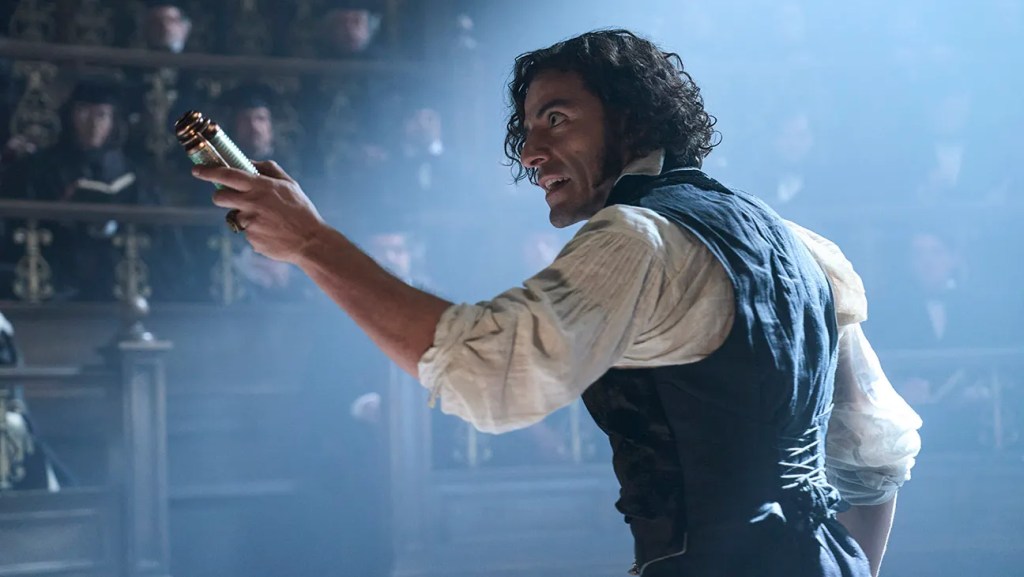
‘Frankenstein’ Review: A Gothic Fable About Humanity, Creation and Loss (Netflix)
Oscar Isaac’s Victor and Jacob Elordi’s Creature anchor a lavish yet sensitive retelling, where the real monster may not be the one assembled from corpses. The film premieres in theaters before later streaming on Netflix.
What defines a man? What makes a man who he is? That philosophical question sits at the heart of Mary Shelley’s 1818 novel Frankenstein and echoes powerfully in Guillermo del Toro’s latest version, delivered with his trademark gothic flourish. More intimate tragedy than horror tale, the Mexican director’s film turns its focus to that unsettling question by examining the interwoven lives of one figure who might be called human and another who, in classical terms, is not. There is violence, blood, death, and destruction, yes—but what pulses most strongly here is a meditation on the nature of humanity.
Del Toro’s adaptation reshapes Shelley’s text, not only altering specific elements but deliberately erasing certain familiar echoes. Structured in three parts—two central movements and one pivot into the past—Frankenstein is a dark fable with roots in the 19th century that speaks directly to the present. The technologies have changed, the limits of possibility have shifted, but the ethical anxieties remain remarkably similar. Without updating the period—rest assured, this is no AI-created monster in modern-day Silicon Valley—Del Toro still engages questions that feel urgent today.
The story begins in the Arctic, where a towering creature shrugs off bullets as it hunts down a peg-legged man and slaughters sailors on the frozen seas. Seeking refuge among them—while the Creature seems to drown, though we know better—Victor Frankenstein (Oscar Isaac) recounts his tale. This “Part I” becomes the story of creation. Del Toro takes his time with the origins: Victor, doted on by his mother but pushed and often mistreated by his aristocratic father (Charles Dance), a renowned doctor intent on passing down his knowledge with brutal severity. When his mother dies prematurely, the father-son relationship collapses.

That loss fuels Victor’s obsession: to conquer death itself. He pours his medical expertise into that mission, carrying within him the colder legacy of his father—a man who demanded, punished, and never gave love. A wealthy arms dealer named Heinrich Harlander (Christoph Waltz) witnesses Victor’s work and agrees to finance his research, for reasons of his own. In the process, Victor reconnects with his younger brother William (Felix Kammerer) and with his fiancée Elizabeth (Mia Goth), whose presence provokes feelings not entirely fraternal.
From their castle—straight out of the gothic playbook—Victor Frankenstein launches into his grand experiment. And it is no spoiler to say that he succeeds. Using an elaborate, baroque system of pseudo-scientific machinery, this “modern Prometheus” creates life, perhaps eternal life. Yet at the very moment of triumph, problems emerge. Most crucially, Victor is dissatisfied with his creation—not so much for its appearance; Del Toro avoids that reading of the original—but for what he sees as its lack of psychological development. What he fails to realize, perhaps, is that his own “educational method” has stunted that growth from the outset.
At a certain point, the film shifts perspective, retelling events through the eyes of the Creature (an unrecognizable Jacob Elordi, in a career-best performance). Out of respect for those unfamiliar with one of literature’s most famous stories, little more will be revealed. Suffice to say, Del Toro seeks to tie loose ends together, showing how genuine empathy and human connection—even in fleeting encounters—might radically alter the Creature’s fate.

Along the way there are tangled love affairs, brutal action sequences, and a touch too much digital spectacle that strains the film’s 19th-century fabric (the wolves, in particular, are a weak spot). As always with Del Toro, the tension lies between the human and the ornamental: his obsession with visual detail sometimes risks overshadowing the drama. Here, that danger is held in check thanks to the way Del Toro and Elordi shape the Creature, keeping its sensitive and humanist core alive.
Without overt attempts at modernization, Del Toro nonetheless links Shelley’s myth to contemporary anxieties—from debates around artificial intelligence to the realization that the true danger often lies not in the technology itself but in the minds that wield it. The difference in how the Creature grows—verbally, emotionally—when interacting with Victor versus another key character (no spoilers) makes Del Toro’s position unmistakable. Appearance matters, but not nearly as much as how we treat one another. That, more than organic matter or scientific wiring, is what defines us as human.
Gothic, romantic, and visually ambitious in ways that demand the big screen (see Frankenstein in theaters if you can, even if Netflix will host it a few weeks later), the film shows Del Toro at his most mature and measured. Still a cinephile conscious of his references, he now works more through character psychology and human contradictions. Victor Frankenstein’s ambition is not, in itself, the problem. The problem is that in pursuing his dream, he abandons his humanity. Like many artists (Del Toro included), he learns that without a human connection between creator and creation, the result can never fulfill its promise.
In that sense, Frankenstein can be read as a kind of mea culpa: a filmmaker rediscovering the most human and sensitive side of his work by creating a character who, technically speaking, isn’t human at all. Though underused, Mia Goth’s character is the one who unlocks that sensitivity in the Creature. She may have nothing to do with the act of creation itself, but she’s the first to grasp that giving life is about more than a physical—or in this case, scientific—process. It’s about endowing those “works” with feeling, allowing them to transcend the mere fact of having been created. No matter how much effort, knowledge, budget, or technology one pours into a project, without a soul there are no creatures, no characters, no films. And this one has all three.



